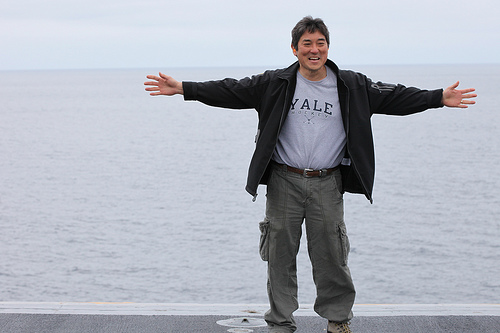If you don't agree that Guy Kawasaki has written the definitive book on self publishing, go look at his table of contents: APE: Author, Publisher, Entrepreneur: How to Publish a Book.
That's okay. I'll wait.
Back? Good. :)
I had been thinking about writing a small step-by-step guide on how to go through the nuts and bolts of the publishing process, but it looks like Guy has covered that.
Today Joe Konrath broke his month-long hiatus and published an interview with Guy Kawasaki, former Chief Evangelist of Apple. Barry Eisler, bestselling author of the John Rain thrillers, conducted the interview.
Here are a few highlights:
Barry Eisler On APE, Guy Kawasaki's New Book
I just finished Guy’s extraordinary new book ... and it’s easily the most comprehensive, best organized, nuts-and-bolts-useful work on self-publishing I’ve seen to date. I think Guy has written the bible on self-publishing, and I expect it will be recognized—and widely used—as such.
Guy Kawasaki On The Advantages And Disadvantages Of A Traditional Publisher
The advantage of a traditional publisher is that it takes care of so many details for you such as content editing, copyediting, cover design, interior design, printing, sales, distribution, and returns. It also provides a large advance. The disadvantage is that it rightfully pays you a lot less and reduces your flexibility.
The Democratization of Information
The historical trend of publishing, like many other industries, is towards democratization and an open system. It used to be that only the church and royalty had scribes. This meant a lower level of literacy, and that one had to go to church to learn about God. Then Gutenberg invented the printing press, and it was possible to print many more copies of the Bible. Now people could learn about God by reading the Bible without going to church.
Fast-forward to the introduction of Macintosh, LaserWriter, and PageMaker, and now anyone with these products could print a book. The current curve doesn’t even involve printing: anyone with a computer, a word processor, and Internet access can upload a book to Amazon. Then anyone with a computer, smartphone, or tablet can read the ebook. The democratization of information is not something to get in the way of.
Physical Limits To Publishing And Gatekeepers
There were physical limits to ... how many titles a store could physically display and stock. This meant that gatekeepers—arbiters of taste—were necessary to act as filters. If Random House or Penguin published a book, it must be good. And only a Random House or Penguin could print the book on dead trees and get the dead trees to the store.
This isn’t true anymore. Do you care who published a book? Do you even look to see who the publisher is before you buy a book? I don’t. I just look at the number of stars it has on Amazon and read a few reviews and buy it.
Unbound Is Kickstarter For Writers
From Unbound.co.uk:
Unbound puts the power of publishing in the hands of authors and readers. Authors pitch their book ideas directly to you. If you back a project before it reaches its funding target, you get your name printed in the back of every copy and immediate behind-the-scenes access to the author’s shed. If any project fails to hit its funding target, you get refunded in full.
Guy's Advice For New Writers: His Views On Book Marketing
The most important thing a self-publisher has to understand is that the hard part of publishing a book is marketing it, not writing it. On the day you start writing your book, you should start building a marketing platform, too. I recommend three hours per day writing and one hour per day building a social-media presence. You cannot wait until you finish your book before you start building a marketing platform. Life for a successful author is doing things in a parallel, not serial manner.Guy's advice turned out to be incendiary so Barry Eisler added his two bits in the comments and I think it's worth repeating. (I didn't get Barry's permission to post this portion of his comment, but it was posted in a public forum and I am confident he would not mind.)
[W]hat makes for cost-effective marketing for your first book, when no one in the world has heard of you, is likely different from what's cost-effective for your 10th, 20th, etc book, when (hopefully) you're a big bestseller. Certainly I've changed my marketing tactics as my circumstances have changed. There were things I did for my first several books that I think were well conceived and well executed at the time, and that I would never do now because my circumstances have changed and the old tactics are no longer cost-effective.I agree. You're not going to see a bestseller like Stephen King enrolling his books in Amazon KDP Select because, regardless of how he feels about Amazon (I have no information on this) he doesn't need the publicity so the exclusivity requirement could only hurt him. On the other hand, an author with absolutely NO following has nothing to lose.
If you'd like to join the conversation over on Joe's site, click here: Comments on Interview with Guy Kawasaki.
Even if you don't agree with all Guy's opinions his book seems like a must-read for independent authors. I know I want to read it.
Other articles you might like:
- The Dark Art Of Critiquing, Part 1: What Makes A Story Good?- The Dark Art of Critiquing, Part 2: Formulating A Critique
- 12 Tips On How To Write Antagonists Your Readers Will Love To Hate
Photo credit: "Guy Kawasaki at front of USS Nimitz" by Robert Scoble under Creative Commons Attribution 2.0.

